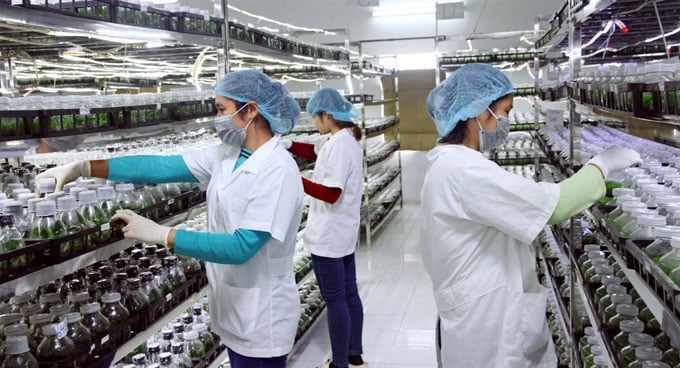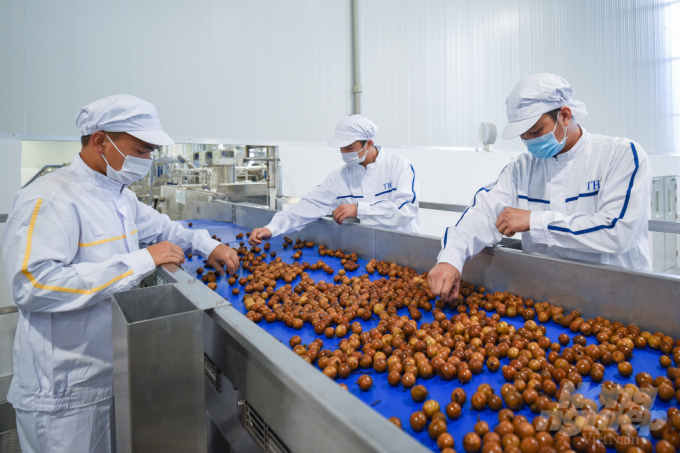June 24, 2025 | 12:01 GMT +7
June 24, 2025 | 12:01 GMT +7
Hotline: 0913.378.918
June 24, 2025 | 12:01 GMT +7
Hotline: 0913.378.918

Improving quality and efficiency as well as applying science and technology to fruit production, processing and consumption are important steps to realize this breakthrough.
As schedule, the province will increase the processing capacity of local factories to 100,000 tonnes per year.
The province currently has many advantages in agricultural production, especially, fruit trees.
Therefore, selecting an investment strategy and attracting investment in fruit production, processing and consumption are believed to be suitable directions that have been implemented for many years.
The province now has about 14 fruit and vegetable processing factories with a total capacity of over 47,000 tonnes per year.
Some businesses have large capacity such as Long Uyen Company Limited’s Tien Giang Branch (located in Chau Thanh district) with a processing capacity of 8,000 tonnes per year; Tien Giang Vegetable and Fruit Joint Stock Company (located in Chau Thanh District) with a capacity of 20,000 tonnes per year; and Nichirei Suco Vietnam Co., Ltd (located in Go Cong Dong District) with a capacity of about 4,000 tonnes per year.
In addition to the Chinese market, processed fruit products are also exported to other markets including the EU, the United States, Japan, South Korea and Russia.
The products encompass canned fruit, juice concentrate and puree as well as dried products from durian and dragon fruit.
Under the general assessment, most of local businesses have gradually invested in technology reform and diversification of products so far.
Some businesses, specialized in fruit exports, also invested in high-yield cold preservation technology to store dragon fruit and durian in the growing area in order to control the price fluctuations in the market.

Processed Vietnamese agricultural products will increase the value of goods.
The cold storage of fruit processing factories has a capacity of about 7,390 tonnes. There are up to 40 businesses investing in setting up cold storages with a total capacity of 6,097 tonnes to store dragon fruit in the province.
Besides, several businesses have processed many high-value and new products from traditional materials, such as Thien An Cordyceps Co., Ltd in Go Cong Tay District produced Cordyceps products or Traviphaco Co., Ltd in Tan Phu Dong District produced custard-apple tea.
The activities of fruit-export businesses have adapted to the current trend.
Tien Giang Province’s fruit and vegetable sector has exported 12,572 tonnes, earning nearly USD26 million in 2020 amid the COVID-19 pandemic, doubled compared to 2016.
However, a large amount of fruit in the province has been consumed mainly through the export of fresh fruit while the amount of processed fruit for export only accounts for about 2 per cent of the total annual harvest.
There are still some shortcomings in the fruit and vegetable processing sector in the province.
The products are not diversified; the quality of raw materials is uneven; the market for consumption is not stable; and the co-operation between suppliers and manufacturing businesses is unsustainable.
Thus, the province needs focusing on attracting businesses to invest in processing fruit and vegetables in order to take advantage and maximize available potentials of the province as well as associate the province’s industrial restructure with agricultural restructure.
Recently, the province now has four projects of farm-produce processing, with a total investment capital of VND1.47 trillion (USD66.4 million) and a total capacity of 50,000 tonnes each year. Besides, there are some projects that are in the process of finishing investment procedures.
It is necessary to implement activities connecting industrial restructure with agricultural restructure in coordinating and deploying the supply of raw materials for the processing industry through focusing on technical and market information support and finding partners for domestic businesses.
Additionally, relevant sectors should create favorable conditions for farmers and manufacturers to have the opportunity to meet and exchange production and business experiences.
They are advised to organize conferences to connect supply and demand of goods; meetings between businesses in many provinces in order to create opportunities for co-operation, exchange of experiences and information on trade and investment; provide full information on a number of technologies and quality of post-harvest preservation of countries with advanced agriculture and post-harvest technology such as the US, Australia, Japan, Israel, Netherlands and Canada to transfer to domestic businesses.
In the long term, it is necessary to form a large raw-material area, promoting the efficiency of science and technology and ensuring the source of raw materials in large quantities to meet the processing industry.
Forming specialized and intensive-agricultural areas as well as applying hi-tech to agricultural production also play an important role in creating a stable and sustainable source of input materials for the processing industry.
/2025/06/17/3942-2-143243_548.jpg)
(VAN) Recently, in Sweden, the Secretary of the Binh Dinh Provincial Party Committee presented the Investment Registration Certificate for the 'Polyester Fabric Recycling Complex' project to SYRE Impact-AB Company.
/2025/06/12/3721-2-202745_83.jpg)
(VAN) TH made an impression at Seoul Food 2025 with its line of natural beverages, paving the way for Vietnamese food products to enter the South Korean market.

(VAN) Soc Trang's success in rice exports stems from a strategy of developing fragrant and specialty rice cultivation areas and standardizing production toward low-emission practices.
/2025/06/11/1311-5-120811_839.jpg)
(VAN) The pig farming industry is facing the challenge of comprehensive restructuring to meet requirements for quality, safety, traceability, and market expansion both domestically and for export.

(VAN) Vietnam considers participating in ALGROALBA in order to expand agricultural production, coordinate the assessment and effective exploitation potential land.
/2025/06/05/5314-1-184727_407.jpg)
(VAN) From seemingly worthless fish scales and skin, enzymes and lactic ferments can transform by-products into peptides, opening a sustainable, effective business direction and elevating Vietnamese seafood.

(VAN) TTC AgriS and IFC signed a strategic partnership to develop a sustainable agricultural value chain, aiming to achieve the Net Zero target by 2035.